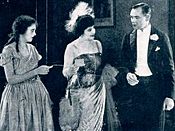Irene Lentz
| Irene Lentz | |
|---|---|

Irene Lentz, Edythe Chapman, and Charles Ray in A Tailor-Made Man (1922)
|
|
| Born |
December 8, 1901 Baker, Montana, U.S. |
| Died | November 15, 1962 (aged 60) Los Angeles, California, U.S. |
| Cause of death | Suicide |
| Resting place | Forest Lawn Memorial Park, Glendale |
| Nationality | American |
| Other names | Irene Gibbons Irene |
| Occupation | Costume designer |
| Known for | Designing costumes for motion picture actors |
| Spouse(s) | F. Richard Jones, Elliot Gibbons |
| Labels | Irene Inc. |
Irene Maud Lentz (December 8, 1901 –November 15, 1962) also known mononymously and professionally as Irene, was an American fashion designer and costume designer. Her work as a clothing designer in Los Angeles led to her career as a costume designer for films in the 1930s. Lentz also worked under the name Irene Gibbons.
Born in Baker, Montana, to Emil Lents and Maud Walters, Lentz started out as an actress under her birth name, appearing in secondary roles in silent films beginning with Mack Sennett in 1921. She played opposite Sennett's leading comedians, Ben Turpin and Billy Bevan. Lentz was directed in her first film by Sennett's production chief, F. Richard Jones; their professional relationship matured into a personal one. They had been married for less than a year when Jones succumbed to tuberculosis in 1930.
Lentz had been taught sewing as a child and with a flair for style, she decided to open a small dress shop. The success of her designs in her tiny store eventually led to an offer from the Bullocks Wilshire luxury department store to design for their Ladies Custom Salon which catered to a wealthy clientele including a number of Hollywood stars.
Lentz's designs at Bullocks gained her much attention in the film community and she was contracted by independent production companies to design the wardrobe for some of their productions. Billing herself simply as "Irene," her first work came in 1933 on the film Goldie Gets Along featuring her designs for star Lily Damita. However, her big break came when she was hired to create the gowns for Ginger Rogers for her 1937 film Shall We Dance with Fred Astaire. This was followed by more designs in another Ginger Rogers film as well as work for other independents such as Walter Wanger Productions, Hal Roach Studios as well as majors such as RKO, Paramount Pictures and Columbia Pictures. During the 1930s, Irene Lentz designed the film wardrobe for leading ladies such as Constance Bennett, Hedy Lamarr, Joan Bennett, Claudette Colbert, Carole Lombard, Ingrid Bergman, and Loretta Young among others. She "is generally regarded as the originator of the dressmaker suit" that was popular in the late 1930s.
...
Wikipedia
